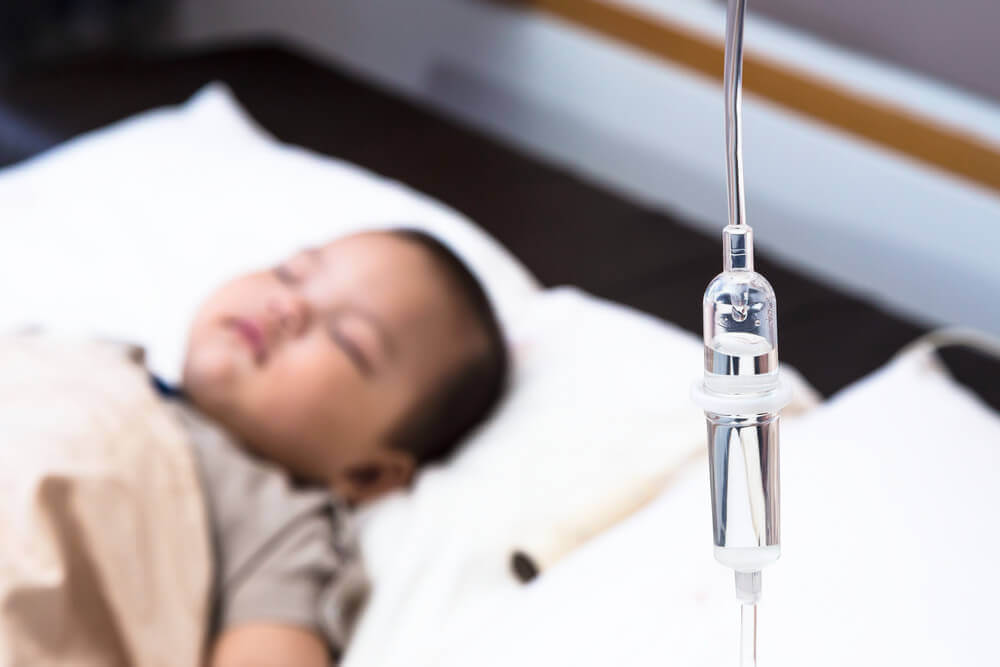Gastroenteritis in Babies: Symptoms, Causes and Treatment


Written and verified by the nurse Leidy Mora Molina
One of the most common childhood ailments, after colds and inflammation of the ears, is gastroenteritis.
Babies can have several episodes of this disease throughout their lives and according to estimates, in Spain, each child under 3 years of age can suffer from it between 0.5 and 2 times a year. At the same time, it’s the second leading cause of infant morbidity and mortality worldwide.
Therefore, it’s essential to know how to prevent it and how to treat it, in order to avoid the riskiest complications. Find out more in this comprehensive article.
What is gastroenteritis in babies?
Gastroenteritis refers to the inflammation of the lining of the stomach and intestines. As a result of this alteration, the gastrointestinal cells are unable to perform their functions properly and tend to lose large amounts of water and mineral salts.
Likewise, the food that reaches the digestive tract can’t be absorbed. Therefore, it ferments, and produces a greater loss of body fluids. The two ways to eliminate this content are diarrhea or vomiting.
According to the evolution time of the condition, it’s classified as acute or chronic. The first lasts less than two weeks and, in general, subsides in the first 2 to 7 days.
Although it doesn’t require curative treatment, the symptoms of babies require prompt treatment in order to avoid their main complication: Dehydration.

What causes gastroenteritis?
This disease can be the result of an infection or other inflammatory conditions. Among the most relevant, the following stand out:
- Gastrointestinal infections: These are the most frequent cause and are generally caused by viruses, such as rotavirus or adenovirus. The form of transmission is fecal-oral, that is, the germ is eliminated through the feces of a child and enters through the mouth of another child. In general, this is caused by the intake of contaminated food and water or by improper handwashing.
- Food intolerances: Such as intolerance to cow’s milk protein or gluten and food allergies (to shellfish, eggs, among others).
- Digestive disorders due to the inadequate introduction of food in the complementary diet.
- Inflammatory diseases in the digestive system.
- A drop in defenses ( immunosuppression ).
- Cystic fibrosis.
What are the symptoms of gastroenteritis in babies?
The most characteristic clinical manifestation of this disease is diarrhea, which is defined by a decrease in the usual consistency of the stool and a considerable increase in the frequency of evacuation.
In general, this symptom can be accompanied by any of the following clinical manifestations:
- Vomiting
- Fever
- Lack of appetite
- Abdominal pain and bloating
- Mucus or blood in the stool (sometimes)
- Irritability
- Decline
- General discomfort
Treatment of gastroenteritis
The treatment of gastroenteritis depends on the cause. With this in mind, it’s important to know that it doesn’t always require antibiotics, as most of the time, it’s caused by viruses and goes away on its own after a week.
As previously stressed, the most important thing is to prevent dehydration, especially in babies under one year of age. Here are some helpful tips to prevent this outcome:
- Breastfeeding should continue on demand and should be offered more frequently if the baby takes shorter feedings.
- To replace water losses, oral rehydration salts (or oral saline) can be offered to the baby. This solution contains water, sodium, potassium, chlorine, and glucose in the correct proportions.
- Regarding diet, it’s best not to force the child to eat. In the event that you demand it, the food must be easy to digest and palatable. It’s important to avoid heavy, fatty, and acidic foods.
- Control losses, both those of the diaper and vomiting. It’s a good idea to keep a daily record to share with the pediatrician.
Regarding pharmacological measures, these are at the discretion of the doctor. As we’ve said, the treatments vary depending on the cause and it’s important not to administer medications without the indication of a professional.
In some viral diarrhea probiotics, such as Lactobacillus, can be prescribed, as several studies indicate the advantages of their use.
How can I prevent gastroenteritis in my baby?
Babies are prone to infections due to their immature defenses. For this reason, it’s important to implement all possible infection prevention measures. Let’s see some tips:
- Immunize the baby with the rotavirus vaccine from 2 months of age, according to the national vaccination schedule.
- Carry out a correct hand washing before preparing the bottle, after changing the baby’s diaper, and after going to the bathroom.
- Keep the changing table clean and disinfected.
- Properly wash food, especially raw fruits and vegetables that are offered to the baby.
- Avoid contact between the baby with sick people.

When to go to the pediatrician?
After the incorporation of the vaccine into the pediatric calendar, the number of hospitalizations for this cause has decreased considerably. In general, these cases are usually self-limited and resolve after about 2 to 7 days.
In some cases, the course of the disease is different and it’s important to consult your doctor when any warning signs appear, such as those described below:
- Diarrhea lasts more than 7 days.
- The vomiting is constant and the baby has more than 3 or 4 episodes in 1 hour.
- The stool has blood or mucus in it.
- Dehydration symptoms appear: Irritability, lethargy, sunken eyes, depressed fontanelle, dry mouth, and absence of tears.
- No urine in the diaper 6 hours after the last change.
- Fever that persists or doesn’t go down with antipyretics.
Gastroenteritis is a common disease, which, if not treated in time, can cause serious damage to the baby’s health. Consult your doctor whenever you have doubts, especially in the presence of warning signs.
One of the most common childhood ailments, after colds and inflammation of the ears, is gastroenteritis.
Babies can have several episodes of this disease throughout their lives and according to estimates, in Spain, each child under 3 years of age can suffer from it between 0.5 and 2 times a year. At the same time, it’s the second leading cause of infant morbidity and mortality worldwide.
Therefore, it’s essential to know how to prevent it and how to treat it, in order to avoid the riskiest complications. Find out more in this comprehensive article.
What is gastroenteritis in babies?
Gastroenteritis refers to the inflammation of the lining of the stomach and intestines. As a result of this alteration, the gastrointestinal cells are unable to perform their functions properly and tend to lose large amounts of water and mineral salts.
Likewise, the food that reaches the digestive tract can’t be absorbed. Therefore, it ferments, and produces a greater loss of body fluids. The two ways to eliminate this content are diarrhea or vomiting.
According to the evolution time of the condition, it’s classified as acute or chronic. The first lasts less than two weeks and, in general, subsides in the first 2 to 7 days.
Although it doesn’t require curative treatment, the symptoms of babies require prompt treatment in order to avoid their main complication: Dehydration.

What causes gastroenteritis?
This disease can be the result of an infection or other inflammatory conditions. Among the most relevant, the following stand out:
- Gastrointestinal infections: These are the most frequent cause and are generally caused by viruses, such as rotavirus or adenovirus. The form of transmission is fecal-oral, that is, the germ is eliminated through the feces of a child and enters through the mouth of another child. In general, this is caused by the intake of contaminated food and water or by improper handwashing.
- Food intolerances: Such as intolerance to cow’s milk protein or gluten and food allergies (to shellfish, eggs, among others).
- Digestive disorders due to the inadequate introduction of food in the complementary diet.
- Inflammatory diseases in the digestive system.
- A drop in defenses ( immunosuppression ).
- Cystic fibrosis.
What are the symptoms of gastroenteritis in babies?
The most characteristic clinical manifestation of this disease is diarrhea, which is defined by a decrease in the usual consistency of the stool and a considerable increase in the frequency of evacuation.
In general, this symptom can be accompanied by any of the following clinical manifestations:
- Vomiting
- Fever
- Lack of appetite
- Abdominal pain and bloating
- Mucus or blood in the stool (sometimes)
- Irritability
- Decline
- General discomfort
Treatment of gastroenteritis
The treatment of gastroenteritis depends on the cause. With this in mind, it’s important to know that it doesn’t always require antibiotics, as most of the time, it’s caused by viruses and goes away on its own after a week.
As previously stressed, the most important thing is to prevent dehydration, especially in babies under one year of age. Here are some helpful tips to prevent this outcome:
- Breastfeeding should continue on demand and should be offered more frequently if the baby takes shorter feedings.
- To replace water losses, oral rehydration salts (or oral saline) can be offered to the baby. This solution contains water, sodium, potassium, chlorine, and glucose in the correct proportions.
- Regarding diet, it’s best not to force the child to eat. In the event that you demand it, the food must be easy to digest and palatable. It’s important to avoid heavy, fatty, and acidic foods.
- Control losses, both those of the diaper and vomiting. It’s a good idea to keep a daily record to share with the pediatrician.
Regarding pharmacological measures, these are at the discretion of the doctor. As we’ve said, the treatments vary depending on the cause and it’s important not to administer medications without the indication of a professional.
In some viral diarrhea probiotics, such as Lactobacillus, can be prescribed, as several studies indicate the advantages of their use.
How can I prevent gastroenteritis in my baby?
Babies are prone to infections due to their immature defenses. For this reason, it’s important to implement all possible infection prevention measures. Let’s see some tips:
- Immunize the baby with the rotavirus vaccine from 2 months of age, according to the national vaccination schedule.
- Carry out a correct hand washing before preparing the bottle, after changing the baby’s diaper, and after going to the bathroom.
- Keep the changing table clean and disinfected.
- Properly wash food, especially raw fruits and vegetables that are offered to the baby.
- Avoid contact between the baby with sick people.

When to go to the pediatrician?
After the incorporation of the vaccine into the pediatric calendar, the number of hospitalizations for this cause has decreased considerably. In general, these cases are usually self-limited and resolve after about 2 to 7 days.
In some cases, the course of the disease is different and it’s important to consult your doctor when any warning signs appear, such as those described below:
- Diarrhea lasts more than 7 days.
- The vomiting is constant and the baby has more than 3 or 4 episodes in 1 hour.
- The stool has blood or mucus in it.
- Dehydration symptoms appear: Irritability, lethargy, sunken eyes, depressed fontanelle, dry mouth, and absence of tears.
- No urine in the diaper 6 hours after the last change.
- Fever that persists or doesn’t go down with antipyretics.
Gastroenteritis is a common disease, which, if not treated in time, can cause serious damage to the baby’s health. Consult your doctor whenever you have doubts, especially in the presence of warning signs.
All cited sources were thoroughly reviewed by our team to ensure their quality, reliability, currency, and validity. The bibliography of this article was considered reliable and of academic or scientific accuracy.
- Beneitez, P. (2015). Gastroenteritis aguda. Pediatr Integral 2015; XIX (1): 51-57.
- Gavilán, C. (2010). Gastroenteritis aguda. Protocolos diagnóstico-terapéuticos de la AEP: Infectología pediátrica. Hospital Clínico Universitario de San Juan. Alicante.
- Yalda, L. (2014) Etiología y manejo de la gastroenteritis aguda infecciosa en niños y adultos. Revista Médica Clínica Condes – 2014; 25(3) 463-472.
- Sánchez, L. (2016). Gastroenteritis aguda en la infancia. Terapéutica secuencial actual en Atención Primaria. Sociedad Española de Pediatría Extrahospitalaria y Atención Primaria. Recuperado de: https://www.sepeap.org/wp-content/uploads/2016/04/Gastroenteritis-BR.pdf
This text is provided for informational purposes only and does not replace consultation with a professional. If in doubt, consult your specialist.








